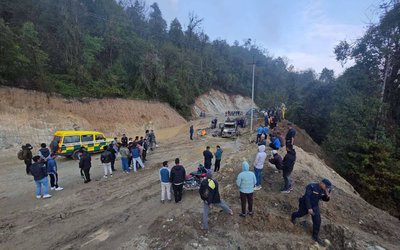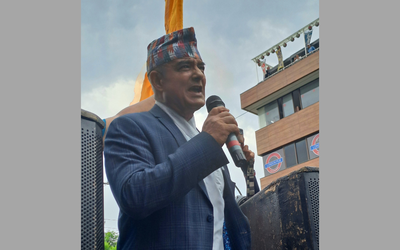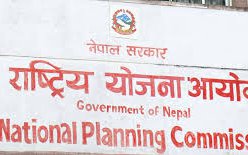
Authorities are investigating a deadly knife attack in the French city of Nice as a terrorist incident. Following the third attack in two months attributed to Muslim extremists, France raised its alert level to urgent.
A knife attack at a church in the French city of Nice left three people dead and several others injured on Thursday.
Following the attack, French Prime Minister Jean Castex raised the country's national security alert to "urgent," the highest possible level.
French President Emmanuel Macron arrived in the city shortly afterwards and spoke of an "Islamist terrorist attack."
Condolences and condemnation of the attack flooded in from around the world.
The attack took place Thursday morning at the Notre Dame Basilica in the heart of the Mediterranean city.
Terrorism investigators said the suspect entered the church and waited a half hour before cutting the throat of the custodian, then nearly decapitating a woman and stabbing a third woman, who escaped the church and died at a nearby cafe.
The suspect was shot and seriously injured by police and is currently being medically treated in custody.
Authorities said that the suspect is a 21-year-old Tunisian man named Brahim Aouissaoui, who recently entered France from Italy. He arrived in Nice by train.
While being detained, the suspect began shouting "Allahu Akbar" (God is great) The attacker is believed to have acted alone.
President Macron announced he will more than double the number of French soldiers deployed for domestic anti-terrorism duties. The number of soldiers will be boosted from 3,000 to 7,000.
"We will thus enable ourselves to protect all places of worship, especially churches, so that the feast of All Hallows on November 1 can take place in the proper conditions," Macron said after arriving at the scene of the attack.
Macron also promised "the support of the whole nation to the Catholics of France and elsewhere."
"Very clearly it is France that is being attacked over our values, our taste for freedom and for the ability on our soil to have freedom of belief," he said, adding that France "will not give any ground."
Nice Mayor Christian Estrosi said it now "time for France to exonerate itself from the laws of peace in order to definitively wipe out Islamo-fascism from our territory."
Suspected killer came from Tunisia
Tunisian court spokesman Mohsen Dali said the suspect is 21-year-old Brahim Aouissaoui, who left Tunisia by boat in September. Dali added that Aouissaoui was not known as a suspected militant before leaving Tunisia.
France's anti-terrorism prosecutor, Jean-Francois Ricard, told a press conference late Thursday that Aouissaoui first entered the EU illegally on September 20 via the small Italian island of Lampedusa. Aouissaoui was then brought to the Italian port city of Bari, where he disembarked on October 9, according to Ricard.
The Italian Interior Ministry said it had issued a notice of expulsion for Aouissaoui, but authorities had lost track of him.
It is unclear when the suspect reached France, however, video surveillance shows him arriving in Nice by train on Thursday morning, Ricard said.
He changed his clothes at Nice's train station and walked a short distance to the cathedral where the attack took place. Ricard added that the suspect was not known to French intelligence services.
The suspect was seriously wounded by police during the attack and is being treated in a hospital. Police in Nice said he was carrying an Italian Red Cross ID card.
A copy of the Koran, two telephones, a knife with a 17-centimeter (6.6 inch) blade used in the attack and two other unused knives were found at the scene of the attack, Ricard said.
Tunisian official Dali said Aouissaoui had been living in Tunisian port city of Sfax, a major starting point for boats carrying people illegally into Europe via Lampedusa, about 130 kilometers 80 miles from the North African coast.
Tunisia condemned the attack and the country's special counter-militancy court said it was beginning an investigation into "the suspicion that a Tunisian committed a terrorist operation abroad."
Under Tunisian law, any citizen accused of involvement in a terrorist act inside or outside of Tunisia may be prosecuted.
- Iran, US to continue talks for nuclear deal
- Apr 20, 2025
- Putin announces Easter ceasefire in Ukraine
- Apr 20, 2025
- ICIMOD Says Hindu Kush Himalaya (HKH) Faces Lowest Rainfall In Third Conseqquetive Year
- Apr 19, 2025
- Tatopani Border Point Will Be Upgraded: Foreign Minister Dr. Deuba
- Apr 19, 2025
- Zelenskyy accuses China of supplying weapons to Russia
- Apr 19, 2025















